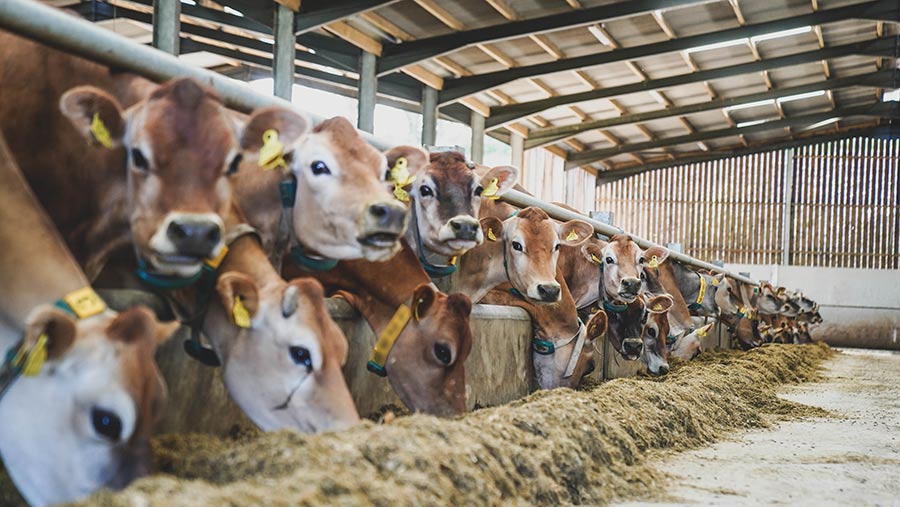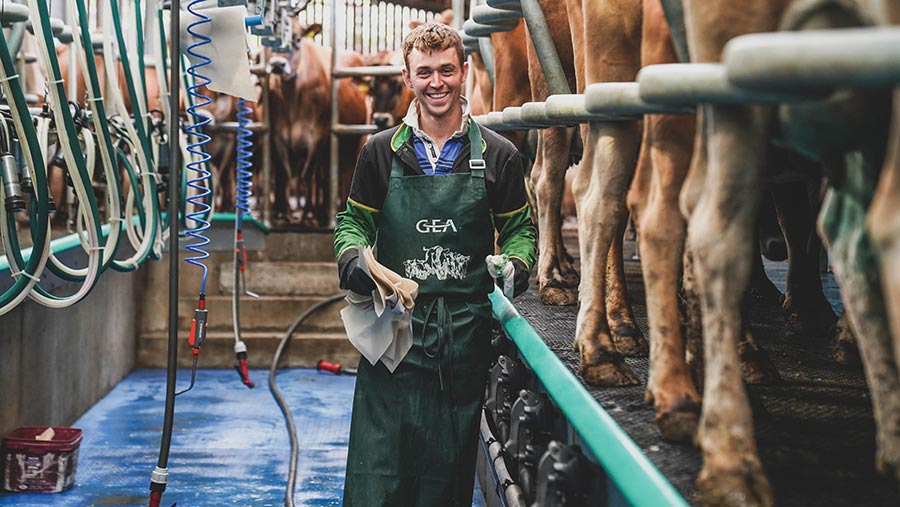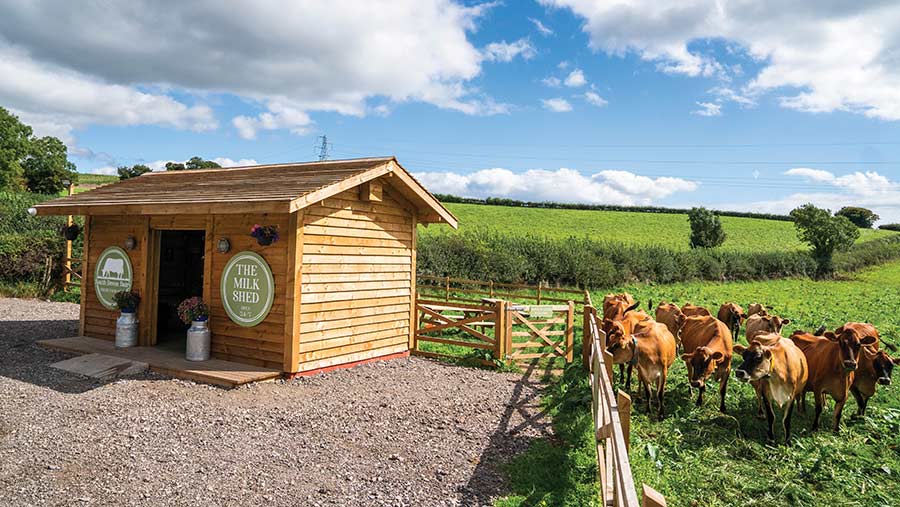How a beef and sheep farm switched to milking Jerseys
 © Emily Fleur
© Emily Fleur Experience on a dairy farm Down Under has inspired a young Devon farmer to take the family farm in a new direction.
The land at Crokers Grange Farm, Ipplepen had been farmed as a beef and sheep unit since Niall Tewson’s father, Mike, took it on in 1993 – initially as a tenant – before purchasing it six years ago.
See also: How beef and sheep farm switched to milking Jerseys
Following a stint there on a grass-based setup milking cross-breds, Niall says he “fell in love with dairy” and returned home the following year full of ideas about how he could restructure the business to move from beef and sheep to milking cows.
Farm facts
Crokers Grange Farm, Ipplepen, Devon
- 202ha farmed
- 227 pedigree Jerseys
- Autumn and spring block calving
- Average yield 7,400 litres at 4.6% protein and 5.4% butterfat
- Artificially inseminated to Cogent sexed semen and rearing all replacements
- Supplying Rivermead Dairies
“At its peak, we had about 3,000 ewes – breeding for Innovis at the time – alongside the beef herd,” says Niall, who made the decision to return home in 2018, aged 23 years.
“While Dad had a succession plan, I had other ideas and wanted to put my own stamp on the business.
“In 2019, I went off to New Zealand and that was probably the biggest driver of change for us.”
Hear from Niall himself in the video and read the rest of the report below.
Business plan
The first stage of the transition was recruiting the help of a financial adviser, he explains.
“We went through budgets, what the farm could hold [in terms of a dairy unit].
“We’ve got a 150-acre grazing platform on this side of the farm – it’s split in two by the main road – so we put a few ideas together centred on that, basing things around a milk price of 32p/litre.”
The decision was made to disperse the suckler herd immediately, which freed up some capital to invest in the dairy.
The sheep stayed in the interim – again, to help with cashflow – but flock size was halved.
With Mike having his own timber business and experience in construction, the Tewsons also budgeted to do a lot of the building work in-house to keep costs down.
The next stage was securing a milk contract. This proved to be the most difficult part, with bigger processors “not even picking up the phone”.
Niall eventually had success with Gordon Davis of Rivermead Dairies, who was able to offer him an initial autumn milk contract to supply Jersey milk for specialist markets.
Gordon has remained a valuable mentor to Niall since, drawing on his extensive experience with Jerseys at his own farm near Tiverton, Devon.
Establishing the herd
Initially, the Tewsons had done three budgets, each based on a different breed: housed Holsteins; cross-breds, grazing all-year-round; and grass-based Jerseys.
However, with a contract based on providing Channel Island milk, making a decision about which breed to go for was relatively simple, says Niall.
“I liked the idea [of cross-breds] but didn’t like the idea of them being outdoors all year. I hadn’t even thought about Jerseys as an option before, but with the contract, it all fell into place.”
Gordon’s son Mark, of Kivells Livestock Auctioneers, helped Niall source the cows, which came from a single Danish herd to meet Niall’s objective of minimising the risk of bringing disease on-farm.
“Mark is pretty much the ‘Jersey king’, and we ended up being able to source 130 in-calf pedigree heifers from a high-merit, high-welfare herd,” says Niall.
This was then followed by buying a total of 100 heifers from three other local herds with high-health status.
Building and construction

Niall Tewson © Emily Fleur
Although new winter accommodation for the beef and sheep enterprises had been built in 2018, it was not fit for dairy cows, says Niall.
With a total redesign needed, he and his father spent time visiting other dairies for inspiration. They also enlisted the help of the late Tim Horwood of Venture Dairies to draw up the plans.
He went on to fit a 24/48 GEA swingover parlour on the farm, which they rated as the simplest and most efficient for their size of herd.
They had to draw up a tight schedule, starting work as soon as the last ewe lambed and completing it before the first heifer was due to calve. In fact, the family had just 73 days between the two.
During this time, they instated drainage, laid concrete, fitted 260 cubicles and installed the parlour, says Niall.
They also reseeded all the grassland with a higher proportion of clover to make it more suitable for dairy grazing and silage, as well as fencing and installing water troughs.
On 19 July 2021, the first milking took place at the newly established South Devon Dairy unit.
Production system
Today, South Devon Dairy stands at 227-head and is operating as a closed herd, rearing all replacements.
Cows are outdoors on a paddock-grazing system from early February to mid-October.
During the winter, they are fed on a total mixed ration of grass silage, maize (grown on-farm), an 18-21% protein blend (depending on the time of year) and straw.
This is pushed up using a Lely Juno feed pusher to save on labour.
All the calves from the initial 130 heifers were retained as followers, but Niall now wants to be more selective in his breeding goals, he says.
“I think we’ve found our sweet spot in terms of our numbers, so now I want to create a well-bred, high-performing, high-health herd. It’s good for the farm and opens doors to sell surplus calves in the future.”
He says he is also exploring moving to an all-year-round system to simplify management and ensure an even supply of milk for the new on-farm vending machine (see box below). This would also suit Rivermead Dairies.
Managing change
Niall says he has been “extremely lucky” with the support he has received from his father in making such big changes to the business.
“Dad loves anything progressive and exciting. While he didn’t want me tied to a cow’s tail initially, it [moving to dairy] has definitely been the right decision.
“It hasn’t been easy, but I’d say what we’ve got out there now is a pretty efficient unit that will take us into the future.”
Further diversification

The milk shed © Emily Fleur
In a bid to further improve the long-term future of Crokers Grange Farm, Niall Tewson has recently opened a milk shed.
This is equipped with a vending machine, dispensing the farm’s own milk, and a coffee machine with beans provided by local business Rugga Coffee.
The shed sits adjacent to a newly established vegetable shed, which is supplied with produce from neighbouring farms, headed up by Niall’s partner, Kellie.
“It is busier than we ever expected it to be,” says Niall. “My vision for the future is to have a farm shop, but this is a good in-between step.”
